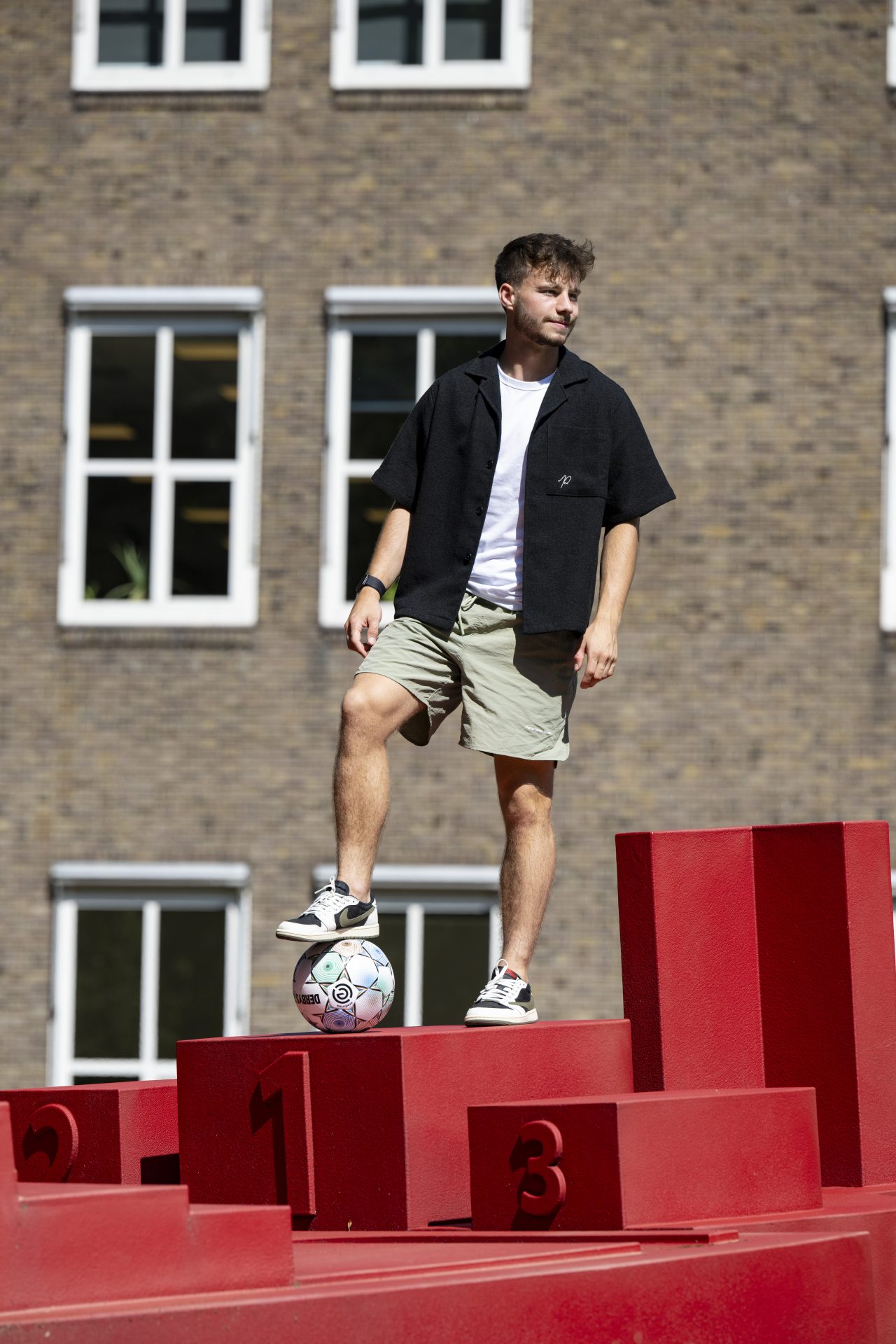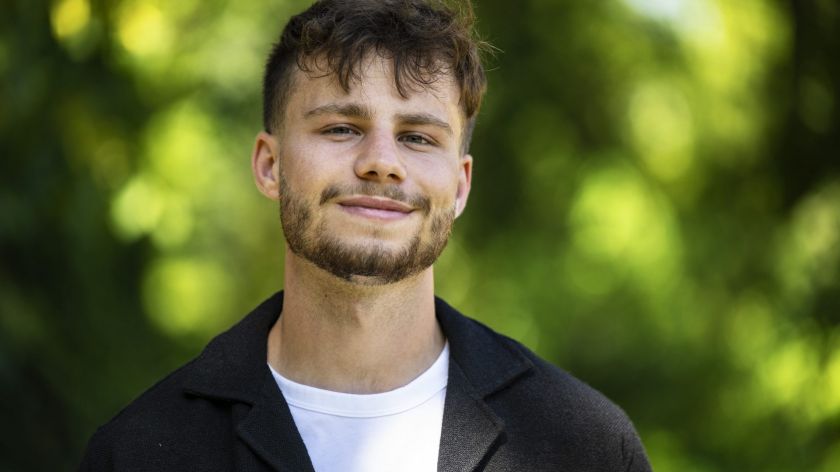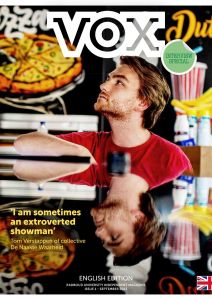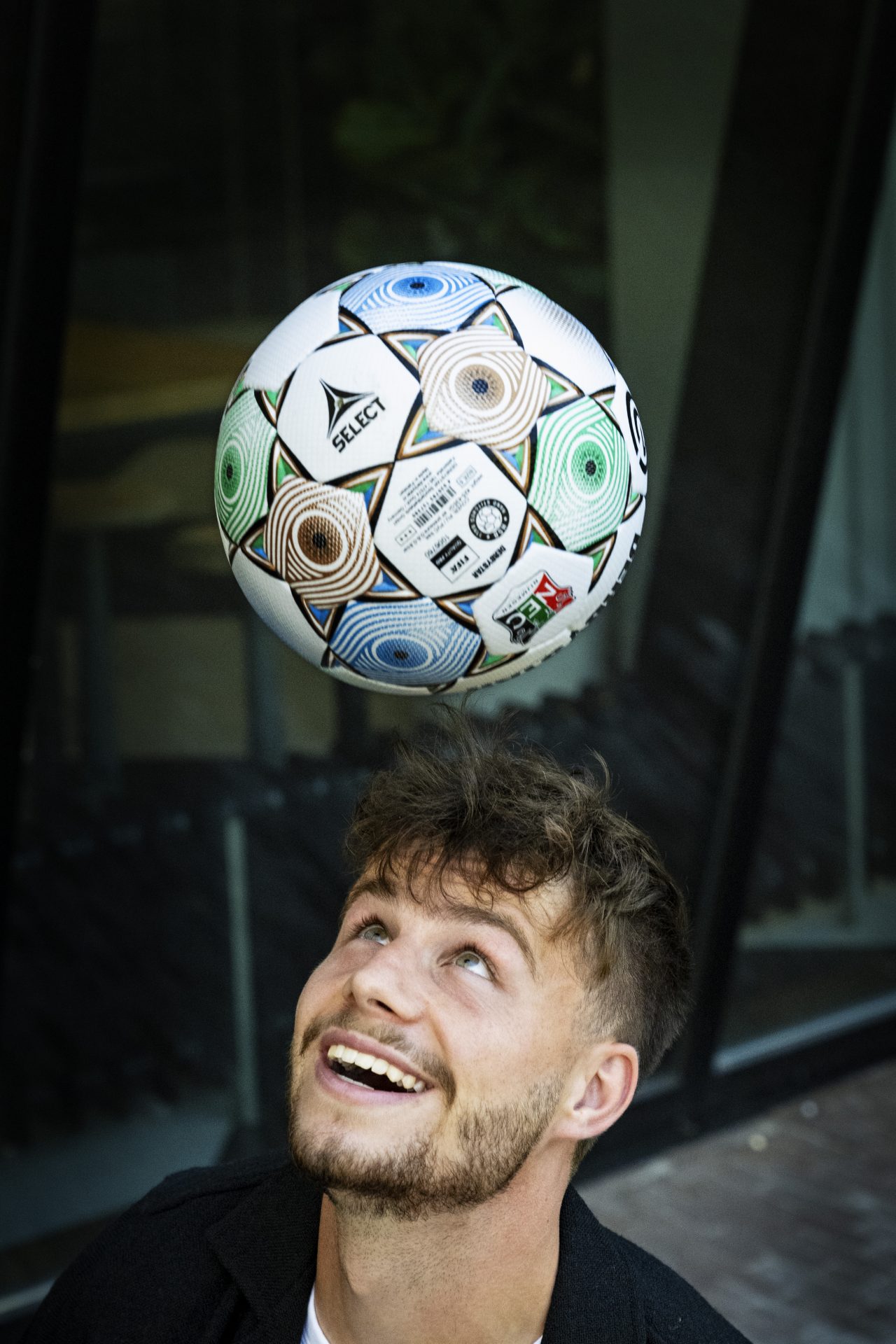The campus and the playing field: The two worlds of Dirk Proper
-
Dirk Proper. Foto: Bert Beelen
Dirk Proper (21) was considered a discovery in last year’s Dutch premier league. The young football player from Elst grew to become a first-team player at NEC and attracted the attention of several top clubs in the Netherlands and abroad in the past. He recently extended his contract while completing his second year of studies at Radboud University. Vox spoke to him about his study programme in Psychology, friendship and, of course, football.
I’ve played football on better pitches,’ says Dirk Proper with a big grin. He stands in front of the Berchmanianum administration building, holding up a ball. The remark is an understatement, as Proper plays every week on the best pitches in the Netherlands. He made his debut in 2017 at the age of 17 at NEC, the club where he has played since age 11. He has since become an important first team player and was voted ‘man of the season’ by the Goffert club supporters.
This interview is part of Vox’s interview special, which can be found in the Vox stands on campus, starting next week. The magazine contains interviews with student and NEC player Dirk Proper; researcher Samira Azabar; virologist Marc van Ranst; producer Tom Verstappen; doctor Tanya Bisseling and her student daughter Jasmijn Olde; friar Stefan Ansinger; and influencer Manon van den Bos.
Three years ago you were considered a talent, but now we’re talking to NEC’s most important player of last season..
‘I do think I’ve made good progress,’ Proper says modestly. ‘This season was definitely a big leap in my career. I want to take that a step further next year, of course.’
He dribbles the ball as we take a walk around the campus. To have more control over the ball, he hands over his personal belongings: his phone and keys. Since last year, he has been living in Nijmegen-West, where he bought a flat that he shares with his brother Gert. He commutes between home, the football club, and the University.
Do you come here often?
‘To be honest, I spend very little time on campus. I watch all the lectures at home because they’re available online. My study programme has very few contact hours. Ultimately, I do everything other students do, just at my own pace. Other students are more likely to attend tutorials that aren’t compulsory. For me, it works differently; I prefer to pass on those tutorials because I find it hard to combine them with football.’
Do you get exemptions as a professional footballer?
‘In principle, I don’t get preferential treatment, nor do I want it. During the pandemic, the Binding Study Advice didn’t apply to anyone, so I could easily move on to the second year of my study programme. Other than that, they’re quite strict here, which is good. Obviously, I think it’s important to attend lectures. But if I communicate in a timely and clear manner, lecturers and student advisors are happy to help me out.
‘I want to do my best on the programme and earn all the study credits fairly’
Jorijn Verbruggen is now my student advisor. Her young son plays football in the same team as Édgar Barreto (former teammate at NEC, Eds.) and I get on with her really well. She says: ‘You can’t get exceptional treatment, compared to the other students, but we can see when we can schedule your tutorials, for example, so you can still attend.’ And that’s how I prefer it too. I want to do my best on the programme and earn all the study credits fairly. In terms of deadlines, I don’t get any slack. It’s mainly about mandatory attendance, which I also have to comply with, of course.’

How far along are you now? Dribbling through the study programme as easily as you pass opponents in the premier league every week?
‘I’m now four years in and I’ve just completed the second year. So I’m on schedule because I do one year in two. It helps that I enjoy studying; I see it as a form of relaxation. When I get home after training at NEC, I obviously can’t go out to train again, or challenge my body even more. Studying involves no physical effort. Besides, I like being in circles other than the football world for a change.’
Three questions for Dirk
What did you want to become when you were little?
‘I always wanted to become a professional football player. I’ve been busy with football since I was a kid, so I never really doubted that.’
Where did you go this summer?
‘With some friends, I went on holiday to Ibiza.’
Who do you admire?
‘Andrés Iniesta, former Barcelona and Spain football player (who is a midfielder, like Proper, and also cannot rely on his height: With his 168 cm, Proper is still three centimetres shorter than the Spaniard, Eds.).’
Can you talk to other players about your studies?
‘I guess I could, but I think there aren’t many workplaces in the world where people move around as much as in football. That makes it difficult to build connections that you keep for the rest of your life, so friendships can sometimes be more superficial than elsewhere. But there are always guys you get along with that bit better. Mattijs (Branderhorst, former goalkeeper at NEC, Eds.) has become a true friend. We have lots of fun and I really enjoy life as a professional football player, but it’s also nice to be among students and talk about things completely different to football.’
So what do you like to talk about, and what are the differences between students and professional football players?
‘About the study programme, and things students are concerned with. Housing and going out, for example. It’s the variation in particular I enjoy. The two worlds have very different dynamics. I like spending time with football players, but in professional football it’s also normal to make fun of each other a bit. It’s highly competitive. Teammates try to put you on the spot, while students are different in this respect. They’re a bit more social, calmer, and empathetic. Locker-room talk is fun and you have to be able to take a hit. Football is a macho world, and you don’t see that as much with students.’
‘Everyone is themselves here on campus,’ Proper says almost philosophically as we proceed with our round. ‘Of course, in a football team you are selected based on your football skills. But that says nothing about who you are as a person. University is about commitment, a certain level of intelligence, and personal interests.’
Do you still have the same study friends you had when you first started?
‘Students have a tendency to accrue study delay, so I’m still in sync with some friends from my first year.’ He laughs: ‘You could say that they’re following in my tracks. Of course, most do finish faster. Sometimes I have tutorials that I can schedule in the afternoon and then I’m fortunate to have a lot of contact with lecturers and fellow students. I do like going out, but I don’t go to student parties very often. I have to be fresh on the training pitch the next morning.’
‘For a long time there was a taboo surrounding psychology and mental coaching in the soccer world’
Proper walks between the administration building and the Erasmus Tower. It’s quiet today. The popular midfielder isn’t recognised by any of the students we meet. As a cyclist passes by and a man walks his dog, Proper says he chose his study programme because he finds the workings of the brain interesting and he enjoys talking to people.
What do you hope to achieve with your study programme?
‘I don’t know yet. I find a lot of components in the study programme interesting. Within Psychology, you have three specialisations: brain and cognition, development, and behaviour and environment. I like them all, and I don’t really have a preference yet, so even in the third year I want to choose my modules as broadly as possible. I want to keep all my options open, for example so I can become a psychologist in healthcare later on.’
Do your studies help you on the pitch?
‘I find the Sports Psychology module interesting, and maybe I already use some of it subconsciously here and there. Because there are so many different personalities in the locker room, you need to know how to trigger someone. It varies a lot from person to person. Sometimes I might have a better sense of how to talk to someone. One player likes it when you call him out hard in the group, while another prefers to have a one-on-one chat after training’
‘Of course, it’s my dream to play in the big European leagues one day’
‘People sometimes think of psychology as learning tricks you can apply in dealing with people, but that’s not what it is at all. For a long time, there was a taboo surrounding psychology and mental coaching in the football world, but fortunately it’s now being used more and more. A key question is: How do you deal with pressure? But also: How do you make a team work, what personalities do you have within the team? I also think about these questions in my work as a professional football player.’
It’s all very practical. How do you feel about the academic side of studying?
‘If I’m honest, my passion doesn’t lie with research. I’m more interested in the knowledge courses, and they’re clearly more practical. Think of interview skills. How do you handle sensitive information? What can you say to a client and what is better left unsaid? I’ve learnt that there’s much more to a conversation than just the words of a psychologist or patient. How does something come across? You should never lie and you should know how to build a conversation.’
‘I think it’s really cool to share this new knowledge with fellow students and practice having such talks straight away. That’s where my passion lies, rather than in writing papers or publishing knowledge. Of course, it’s important to know how to deal with academic papers, but doing research doesn’t appeal to me so much at the moment. Maybe I’ll be more interested in it in a couple of years.’
As we near the Cultuurcafé, a push message appears on our phones. ‘Dirk Proper to AZ,’ it says. Apparently it’s just a rumour spread by Voetbal International magazine, but the message is a good pretext to ask him about his future.
What do you want to achieve by playing football?
‘Football is a hectic world: you have to take it day by day. I don’t know anything about AZ, and right now I’m happy at NEC. Above all, I want to perform well again this season, and who knows what will come my way after that. Of course, it’s my dream to play in the big European leagues one day: England, Germany, Italy, or Spain. Who knows, maybe it will happen. Or maybe I’ll just keep playing football at NEC until I turn 38 and then become a psychologist. That’s certainly a possibility.’







